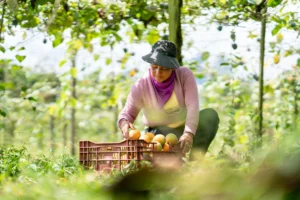By Noelle Musolino
Noelle Musolino is a first-year associate at Wallace & Graham, a plaintiff’s law firm in North Carolina that she first heard of when reading about their work suing factory farming operations. She is currently working on a book, “Except Agriculture: The Government’s Idolization of Factory Farms.” Before working as an attorney, Noelle was involved with the Food Law and Policy Clinic for two years as a clinical student and a research assistant. She is currently also working on a piece with Professor Emily Broad Leib about food waste and the international right to food. To read more of her writing, subscribe to her substack where she is currently posting weekly chapters of her book.
“Back then I heard about the catchers and how they had to catch six birds at the same time in their hands to put them fast to the cage, and I saw their hands… their fingers are like this thick.”
Magaly Licolli, a labor rights activist who works to represent poultry workers, used the full extent of her fingers to make a ring as she spoke. The “o” shapes she made with her hands and widened eyes told the story of the calloused chicken catchers who load fattened birds into trucks for the poultry industry.
Many of these catchers are kids. Children staff a wide exhibition of perilous and often gruesome roles in the agricultural sector, yet child labor laws in the United States make special exceptions for agriculture. So do adult labor laws.
Air pollution from livestock operations causes 13,000 deaths a year, but the Environmental Protection Agency makes exceptions for agriculture when enforcing the Clean Air Act. People get cancer, leg amputations, and physical and mental disabilities from living next to industrial agriculture, but most states have statutes that limit lawsuits against agricultural operations. Animals spend their lives in confinement, developing sores, lesions, trauma, symptoms of clinical depression, and cannibalistic tendencies in giant warehouses that look nothing like the precious, poppy-red barns on supermarket stickers, but animal abuse statutes in the United States exempt agriculture as well.
“Agricultural exceptionalism,” the pervasive idolization of agrarian ideals in the United States, has led to a society where industrial agriculture escapes regulation, receives mountains of cash from government subsidies, and wreaks havoc on the most vulnerable populations in our nation.
Except Agriculture: The Government’s Idolization of Factory Farms, is a short book written by former Food Law and Policy Clinic Student, Noelle Musolino, in which she seeks to tell the history of agricultural exceptionalism, beginning with its colonial inceptions and stretching to the modern-day laws that help colloquially-titled “factory farms” destroy communities with state approval.
The work contains stories of affected individuals, activists, and lawyers from interviews; personal narratives; and legal explanations. It lays out the injustices that suffering and marginalized communities face because of industrial agriculture and then describes how the legal system explicitly allows, and even encourages, these problems. Except Agriculture is about how the law holds agriculture on a pedestal while corporate farms grind America’s most vulnerable groups under their boots.
In what seems to be a parallel universe to the one in which the child chicken catchers grow up, many people in the United States spend their childhoods in small farming towns feeding horses or concrete jungles where the local fauna is mostly composed of pigeons and lapdogs. The prevailing mental image of farms looks like rolling hills dotted with spotted cows that surround splintered-wood barns. This book attempts to expand that vision to the mega-CAFOs stretched across much of the United States today.
Visions expanded, the work will conclude by inviting readers to take action against the corrupt system we have built.
Subscribe to Noelle’s substack here to get weekly updates as she posts the book as a series of blog posts with a new chapter out every Saturday!


Food Law & Policy, Commentary
Policy to Reduce Methane Emissions and Feed More People
April 3, 2025